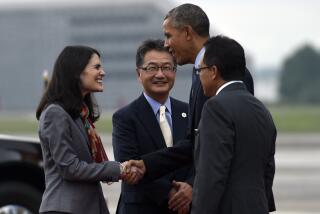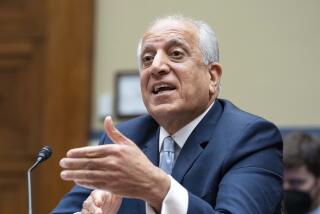U.S. Envoy Named to Coordinate Iraq Opposition
- Share via
WASHINGTON — Secretary of State Madeleine Albright on Thursday announced the appointment of a special U.S. envoy to Iraq’s opposition with a mandate to coordinate the disparate array of groups trying to topple President Saddam Hussein.
To deal with the leading opposition factions, Albright appointed Frank Ricciardone, a career diplomat now serving as deputy chief of mission in Ankara, the Turkish capital.
The difficulties facing Ricciardone were underlined Thursday when the largest Shiite Muslim opposition group rejected the Clinton administration’s offer of financial aid, supplies and logistical help.
“We have not received any aid from the United States, and we believe that this is an incorrect way to deal with the Iraqi opposition,” said Hamid Bayati of the Iran-based Supreme Council for the Islamic Revolution in Iraq. “Such methods ruin the image of the Iraqi opposition. Our answer is ‘Thanks, but no thanks.’ ”
Bayati’s group is one of seven organizations that the administration had designated Tuesday as eligible for some of the $97 million allocated by Congress last year for the Iraqi opposition. His group is key because Shiite Muslims are the largest of Iraq’s three major ethnic groups.
“With the aid of Frank Ricciardone and his team, we will persist in helping the Iraqi people re-integrate themselves into the world community by freeing themselves from a leader they do not want, do not deserve and never chose,” Albright said in a speech to the Center for National Policy, a Washington think tank she once headed.
The appointment reflects the U.S. belief that even after eight years of punishing sanctions, there is still a long way to go before Hussein’s regime is replaced. The challenges ahead were also reflected in the arrival Thursday of the first shipment of U.S. Patriot missiles in Turkey for use in case the conflict with neighboring Iraq escalates.
Washington and Baghdad now seem determined to take more aggressive steps to bring an end to the wearing drama.
Baghdad is now trying to undermine U.S. strategy by challenging the legality of Western-imposed “no-fly” zones in northern and southern Iraq. Baghdad has been challenging the U.S. and British aircraft monitoring the two areas by defiantly flying its own warplanes in the zones. The BBC reported Thursday that Iraq was beefing up its air defenses in the south of the country.
Meanwhile, the United States is escalating its efforts to topple Hussein, partly through the 1998 Iraq Liberation Act approved by Congress last summer. With the appointment of Ricciardone, who will also have military and political advisors, that effort can now get underway.
Ricciardone, who gets high marks from his peers in diplomatic circles, has served in key Iraq listening posts in Jordan and Turkey and as political advisor to Turkish and U.S. commanders running humanitarian operations in northern Iraq.
Yet eight years after the Persian Gulf War, he faces awesome obstacles, according to Iraq specialists.
“On a 10-point Olympic scale, the level of difficulty is 9.6,” said Judith Yaphe, an Iraq specialist at National Defense University.
The most fundamental problems are the disarray among the diverse opposition groups and the absence of a viable leader, Iraq experts say.
More to Read
Sign up for Essential California
The most important California stories and recommendations in your inbox every morning.
You may occasionally receive promotional content from the Los Angeles Times.













